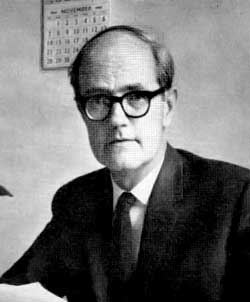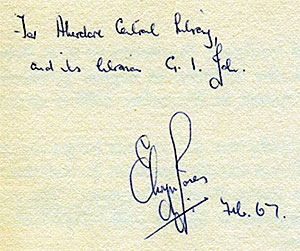Elwyn Jones
writer, bbc producer and executive
ABGS 1935 - 1942

Elwyn Jones (in 1965)
Elwyn Jones was born 4 May 1923, the son of local councillor Evan Edwin Jones, a checkweigher of 27 Byron Street Cwmaman. He attended Cwmaman Boys Council Elementary School 1930-35 and Aberdare Boys County School 1935-42. In his fifth year he won one of the Western Mail St David’s Day Essay Competition prizes1. He passed his School Certificate in 1940, then ‘Highers’ in English, Economics and History in 1942. In his final year, 1941-42, he was Head Boy. He won both a Glamorgan County and a Leverhulme Scholarship to study at the London School of Economics, but left in 1944 before taking a degree.
On leaving university he went initially as a reporter to News Review, later becoming its features editor. After a 14-year run the weekly magazine ceased publication in 1950, and Elwyn found a position at the BBC initially as an assistant to the literary editor of the Radio Times, and latterly as Television Editor to 1957.
Between 1957 and 1966, he became a prolific scriptwriter and producer at the BBC with his first production being screened in Sunday Night Theatre in 1959. At the same time he rose through the managerial ranks to become eventually, in 1963, Head of Drama (Series), working for Sydney Newman who was Head of Drama at the BBC. During this period he co-created Z‑Cars, the legendary series that tackled police work in a more realistic way than had been screened in the earlier BBC series featuring the avuncular PC George Dixon in the police drama Dixon of Dock Green. Elwyn wrote several of scripts for Z-Cars (1960s) (running from 1960 to 1978, with over 667 episodes), and for the later series Softly Softly (1967-69), then Softly, Softly: Taskforce (1970-72), and Barlow at Large, which he again co-created. He also produced Corrigan Blake (1963); wrote scripts for the original Dr Finlay’s Casebook (1967), was involved in the initial concept for the Doctor Who serial The Highlanders; wrote scripts for The Revenue Men (1967); was series editor for Gazette (1968); wrote the books On Trial: Seven Intriguing Cases of Capital Crime (1978); and The Deep Concern (1979), plus several others in the Barlow series, several of which were translated into German.
In the period 1965-1982 Elwyn became a freelance writer and journalist writing feature articles for The Sunday Telegraph. In 1973 he co-wrote the book The Ripper File, and later in 1976 a six-part BBC television series Second Verdict, both involved the reinvestigation of historical crimes, the latter involving the two detectives Barlow & Watt.
Elwyn won the Edgar Allan Poe Award from the Mystery Writers of America for his book The Last Two to Hang (1966) in which he chronicled the story of Peter Anthony Allen and Gwynne Owen Evans, the last men to be hanged in Britain. Then, in 1981 he wrote Death Trials.
Welsh speaking, he also translated Saunders Lewis’s play Brad which he adapted for television2. In Wales he worked with the Welsh Arts Council Drama Committee; and at the Barry National Eisteddfod in 1968, he was a Drama Adjudicator3. Having a love of music he was often seen at productions of the Welsh National Opera Company. He was also a frequent visitor to the USA.
On 19 May 1982, Elwyn died suddenly at the age of 59 at his home near Llandysul, where he had lived since 1975. His funeral service took place at Swansea Crematorium, Morriston on 22 May, with donations invited for the Writers Guild of Great Britain Benevolent Fund. At the time of his death he left a wife, Jennifer (née Moore from Stockbridge Massachusetts, whom he married on 12 March 1975), and a daughter. In his will he left £100,911.



The first image shows the front of the dust jacket of Elwyn’s book The
Last Two To Hang, which is held at The Aberdare Library
the second image is the right-hand title page, with Elwyn’s signature,
and the third is a close up of Elwyn’s dedication of
the book to the Library and to its librarian Glyn Ivor John (ABGS 1922-28).
Footnotes:
1 His entry for the Western Mail St David’s Day Essay Competition is
on page 17 of the 1939 Aberdarian Magazine, which can be found elsewhere on
this website.
2 The English text of Brad was published in Presenting Saunders Lewis,
edited by Alun R. Jones and Gwyn Thomas (University of Wales Press, Cardiff, 1973 & 1983),
as “Treason, Translated and adapted for television by Elwyn Jones”,
pp. 301-357. (However, the ‘Author’s Introduction’ was translated
by Marian Elias.)
3 Elwyn Jones’ adjudication for the competition ‘Drama Hir Wreiddiol’ was
published in Cyfansoddiadau a Beirniadaethau Eisteddfod Genedlaethol Frenhinol Cymru,
Y Barri a’r Fro 1968 (Gwasg Gomer dros Lys yr Eisteddfod Genedlaethol, 1968). pp. 159-160.
Apparently that year no one was judged as being worthy of the trophy, or the full £100
prize money, which was due to be award for this competition, but Ken Etheridge of Rhydaman,
who used the pseudonym of ‘Sieffre’, was awarded £75 for his drama ‘Y
Tywysog’.
Sources:
1 Aberdare Leader, Obituary, 27 May 1982
2 The Guardian, Obituary, 20 May 1982
3 The Times, Obituary, 20 May 1982
4 Companion to the Literature of Wales, Meic Stephens, OUP 1986, ISBN:
0192115863
5 The Last Two to Hang, Aberdare Reference Library. The Aberdare Library edition:
Stein and Day, New York, 1966
6 The Internet Movie Database (IMDb) at
https://www.imdb.com/name/nm0428034/bio ,
accessed on 27 March 2012.
Acknowledgements:
We wish to thank the staff of the reference section of Aberdare Library, and
the Enquiries Staff at The National Library of Wales for providing some of the information
for this account of the career of Elwyn Jones.